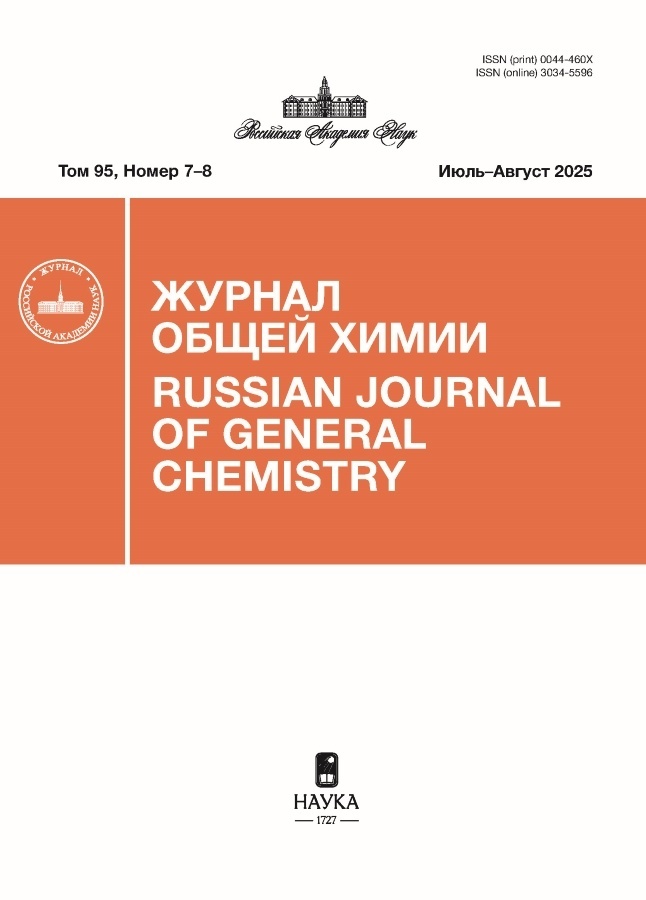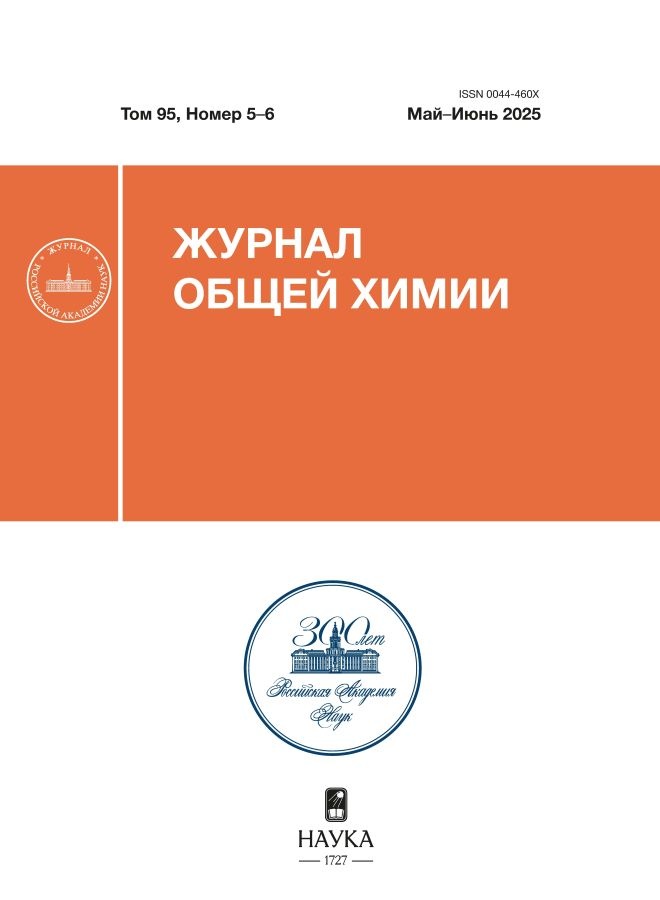Vol 95, No 5-6 (2025)
Articles
Hydrogen-bonded dialkylcarboxamide cations and their dihalogenohalogenates
Abstract
Molecular geometry, electron structure and thermodynamic parameters for a representative group of tertiary amides and bis(amide)hydrogen cations were computed by density functional theory at ωB97X-V/dgdzvp//ωB97X/dgdzvp level, trihalide salts of these cations were synthesized, and NMR manifestations of short hydrogen bond in these cations were experimentally demonstrated. With a vocabulary of computational techniques, a number of intramolecular noncovalent interactions such as H···O+···H, C–H···O, C–H···Н–С were revealed, and the role of these interaction in the stabilization of hemiprotonated amides and their saline forms evaluated.
 154-183
154-183


Synthesis and analgesic activity of 4-Aryl-2-hydroxy-4-oxobut-2-enamides
Abstract
4-Aryl-2-hydroxy-4-oxobut-2-enamides were synthesized by the reaction of 5-aryl-2,3-dihydrofuran-2,3-diones with ammonium formate in glacial acetic acid. Structure of the obtained compounds was confirmed by IR, 1H and 13C NMR spectroscopy, mass-spectrometry and X-ray structural analysis. Synthesized substances were tested for analgesic activity.
 184-190
184-190


Three-component synthesis and antibacterial activity of 5-Aryl-4-acyl-3-hydroxy-1-(4-methoxyphenyl)-3-pyrroline-2-ones
Abstract
A series of new 5-aryl-4-acyl-3-hydroxy-1-(4-methoxyphenyl)-3-pyrrolin-2-ones was synthesized by the reacting of methyl esters of aroylpyruvic acids with a mixture of aromatic aldehyde and p-anisidine. Antibacterial activity of the obtained compounds was studied in vitro against Staphylococcus aureus and Escherichia coli strains.
 191-198
191-198


Three-component synthesis and cytotoxic properties of fluorine-containing 1,4-dihydropyridines with hydroxyphenyl substituents
Abstract
The synthesis of fluorinated 1,4-dihydropyridines containing a 4-aminophenol fragment was demonstrated based on a multicomponent reaction of CH-acids (acetoacetic ester and ethyl 4,4-difluoroacetoacetate) with 4-fluorobenzaldehyde and aminophenols. It was shown that the interaction of ethyl 4,4,4-trifluoroacetoacetate with 4-fluorobenzaldehyde and 4-aminophenol results in the formation of an imine – a condensation product of the aldehyde with the amine. The cytotoxic activity in vitro of the synthesized compounds was determined. It was shown that the highest sensitivity to the toxic effect of 1,4-dihydropyridines was demonstrated by colorectal carcinoma cells HTC-116 (IC50 values 14.18 and 38.61 μm, respectively).
 199-205
199-205


Synthesis of 2-oxomethylcytisine derivatives with nootropic activity
Abstract
A library of 2-oxomethylcytisine derivatives, including conjugates with a phenyl fragment linked to the starting molecule via aminomethyl, acyl, ethenyl, ethyl, thio-, and carboxamide, as well as propenone spacers, has been synthesized. This library also includes Diels–Alder adducts with N-substituted maleinimides. The nootropic activity of the synthesized compounds was studied in vivo using the CPAR test. Three samples were found to have comparable or superior activity to the reference drug Piracetam (the latent period for the first entry of laboratory animals into the dark chamber at the stage of reflex reproduction was 271.7±50.3, 288.8±50.8 and 300.0±0.0 seconds versus 270.9±29.1 seconds, respectively).
 206-214
206-214


Synthesis and antifungal activity of new sulfides with fragments of metronidazole and monoterpenoids
Abstract
The reaction of bromoacetylmetronidazole with monoterpene thiols of pinane and bornane structures yielded new sulfides, which were tested for antimicrobial activity and cytotoxicity. Compounds with fragments of myrtane and myrtentiols showed fungicidal activity against yeast fungi Candida albicans, Candida tropicalis and Candida parapsilosis, while derivatives with fragments of hydroxypinane thiols were not toxic to cells of the lung epithelium of the cow embryo.
 215-223
215-223


Tensimetric study of [ClSb{Cr(CO) 5}2]2 and its reaction with pyridine
Abstract
Thermal stability of [ClSb{Cr(CO)5}2]2 and its reaction with pyridine was studied by static tensimetry method with membrane null-manometer. [ClSb{Cr(CO)5}2]2 is thermally unstable and decomposes at 50–80°C with the formation of carbon monooxide and chromium hexacarbonyl. Upon reaction with pyridine on heating instead of the expected ClSb{Cr(CO)5}2∙Py formation of СO, Cr(CO)6, Cr(CO)5∙Py, antimony and supposedly complex of chromium dichloride with pyridine are formed.
 224-230
224-230


Thermolysis of a mixture of [Pd(NH3)4]Cl2 and (NH4)10[H2W12O42] in an inert atmosphere
Abstract
The features of the thermolysis of a mixture of tetraamminepalladium(II) dichloride with ammonium paratungstate were studied. The products were analyzed by X-ray diffraction, thermal analysis, and mass spectrometry. It was shown that thermolysis proceeds through the reduction of palladium and tungsten. The reducing agent is inner-sphere ammonia in statu nascendi, initiating the reduction of palladium, which induces the reduction of tungstate ions with the formation of a solid solution. It was shown that the reduction of a base refractory metal is facilitated by the presence of a noble metal, and the stabilization of tungsten by palladium atoms leads to the formation of an ordered solid solution.
 231-238
231-238













